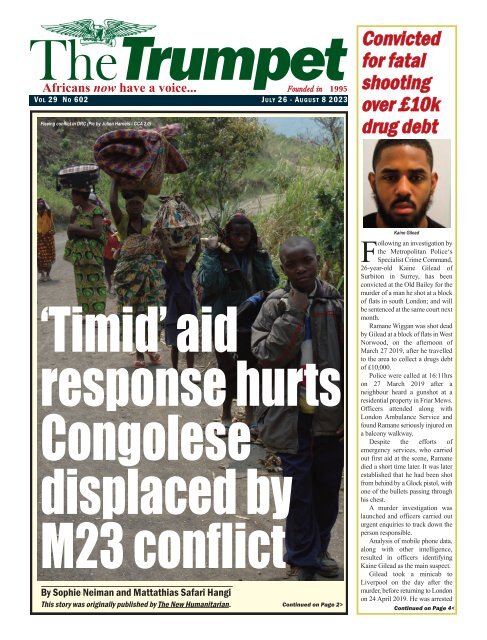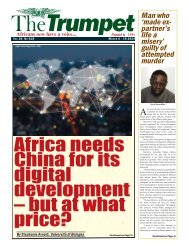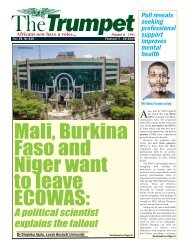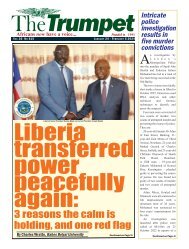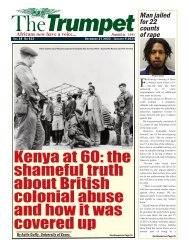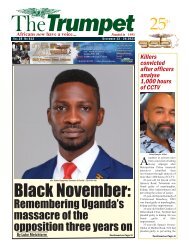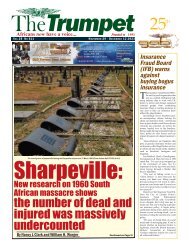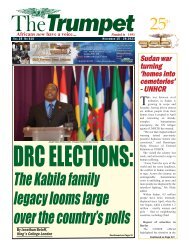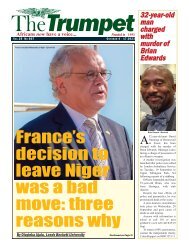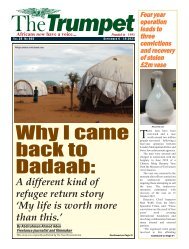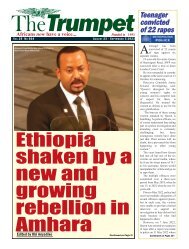The Trumpet Newspaper Issue 602 (July 26 - August 8 2023)
'Timid' aid response hurts Congolese displaced by M23 conflict
'Timid' aid response hurts Congolese displaced by M23 conflict
You also want an ePaper? Increase the reach of your titles
YUMPU automatically turns print PDFs into web optimized ePapers that Google loves.
<strong>The</strong><strong>Trumpet</strong><br />
Africans now have a voice... Founded in 1995<br />
V O L 29 N O <strong>602</strong> J U LY <strong>26</strong> - AU G U S T 8 <strong>2023</strong><br />
Fleeing conflict in DRC (Pic by Julien Harneis - CCA 2.0)<br />
Convicted<br />
for fatal<br />
shooting<br />
over £10k<br />
drug debt<br />
‘Timid’ aid<br />
response hurts<br />
Congolese<br />
displaced by<br />
M23 conflict<br />
By Sophie Neiman and Mattathias Safari Hangi<br />
This story was originally published by <strong>The</strong> New Humanitarian.<br />
Continued on Page 2><br />
Kaine Gilead<br />
Following an investigation by<br />
the Metropolitan Police‘s<br />
Specialist Crime Command,<br />
<strong>26</strong>-year-old Kaine Gilead of<br />
Surbiton in Surrey, has been<br />
convicted at the Old Bailey for the<br />
murder of a man he shot at a block<br />
of flats in south London; and will<br />
be sentenced at the same court next<br />
month.<br />
Ramane Wiggan was shot dead<br />
by Gilead at a block of flats in West<br />
Norwood, on the afternoon of<br />
March 27 2019, after he travelled<br />
to the area to collect a drugs debt<br />
of £10,000.<br />
Police were called at 16:11hrs<br />
on 27 March 2019 after a<br />
neighbour heard a gunshot at a<br />
residential property in Friar Mews.<br />
Officers attended along with<br />
London Ambulance Service and<br />
found Ramane seriously injured on<br />
a balcony walkway.<br />
Despite the efforts of<br />
emergency services, who carried<br />
out first aid at the scene, Ramane<br />
died a short time later. It was later<br />
established that he had been shot<br />
from behind by a Glock pistol, with<br />
one of the bullets passing through<br />
his chest.<br />
A murder investigation was<br />
launched and officers carried out<br />
urgent enquiries to track down the<br />
person responsible.<br />
Analysis of mobile phone data,<br />
along with other intelligence,<br />
resulted in officers identifying<br />
Kaine Gilead as the main suspect.<br />
Gilead took a minicab to<br />
Liverpool on the day after the<br />
murder, before returning to London<br />
on 24 April 2019. He was arrested<br />
Continued on Page 4
Page2 <strong>The</strong><strong>Trumpet</strong> JULY <strong>26</strong> - AUGUST 8 <strong>2023</strong><br />
News<br />
‘Timid’ aid response hurts Congolese<br />
displaced by M23 conflict<br />
Continued from Page 1<<br />
Feza Wineza left her displacement camp in<br />
eastern Democratic Republic of the<br />
Congo one morning in April, seeking food<br />
for her young son who did not have enough to<br />
eat. When she returned three days later, she said<br />
her child had died of hunger.<br />
“He was a good child; he was very humble,”<br />
Wineza told <strong>The</strong> New Humanitarian from<br />
Kalinga camp, which is perched on slopes<br />
surrounding the town of Masisi, in the restive<br />
province of North Kivu.<br />
Wineza is one of around a million people in<br />
North Kivu that have been displaced amid a<br />
rebellion by the Rwanda-backed M23 armed<br />
group, which claims it is fighting to protect local<br />
Tutsis and because the government broke a past<br />
peace agreement.<br />
Aid agencies say insecurity and insufficient<br />
funding from donors means they are failing<br />
people displaced by the conflict, whose<br />
humanitarian impact is among the worst of the<br />
various ongoing insurgencies in eastern DRC.<br />
Humanitarian relief is particularly sparse for<br />
displaced people scattered across North Kivu’s<br />
rural territories of Masisi and Rutshuru, where<br />
the M23 – thought defeated after its last<br />
rebellion a decade ago – has seized ground since<br />
last year.<br />
But conditions are also dire for those who<br />
have sought safety in camps on the outskirts of<br />
Goma, the sprawling capital of North Kivu, and<br />
a hub for international aid agencies and a UN<br />
peacekeeping mission.<br />
In the absence of reliable assistance, local<br />
community groups – who often criticise aid<br />
agencies for spending large sums on the salaries<br />
and living conditions of expatriate staff, and<br />
other overheads – have been distributing food in<br />
some camps.<br />
Displaced people are also increasingly<br />
relying on each other: Women are providing<br />
counselling services in camps to survivors of<br />
sexual violence, while other residents are<br />
donating funds to support makeshift pharmacies.<br />
Still, it is hard for displaced people to<br />
support one another given their own level of<br />
need, said 40-year-old Dusabe Kanane, who fled<br />
an M23 attack in May and is now living in a<br />
Solicitor and Partner<br />
of an award-winning<br />
law firm<br />
S.A.J<br />
LEGAL<br />
based in the heart of<br />
Central London -<br />
Kolade Jegede<br />
specializes in:<br />
Immigration - Preparing of all<br />
Immigration matters, including<br />
Appeal Challenges and Tribunal<br />
Representation.<br />
Employment - Handling all types<br />
of Employment Claims.<br />
Family Law - Dealing with Divorce<br />
Applications, Financial Arrangements,<br />
and Applying for Non-Molestation /<br />
Occupational Orders.<br />
First consultation is FREE.<br />
T: 07818 118656 E: kj@saj.legal<br />
Displaced persons set up new 'homes' in Masisi (Pic by Oxfam East Africa - CCA 2.0 Generic)<br />
camp on the outskirts of Goma.<br />
“That lady laying down, she looks like she is<br />
sick, but she is not really sick,” Kanane said,<br />
pointing at a lethargic woman on the floor next<br />
to her. “She is starving... but I am not able to<br />
help her. <strong>The</strong>re is no way to even feed my<br />
children.”<br />
International neglect: ‘<strong>The</strong>y don’t think<br />
about us’<br />
<strong>The</strong> M23 is led by Congolese Tutsis and<br />
descends from a long line of DRC rebel groups<br />
with links to neighbouring Rwanda. Support<br />
began in the 1990s as Rwanda hunted down<br />
Hutu militias that fled to DRC after committing<br />
genocide against Rwanda’s Tutsis.<br />
Rwanda’s interventions led to civil wars that<br />
sucked in other regional States and further<br />
weakened a country that had already been<br />
devastated by brutal colonial rule, foreign<br />
meddling after independence, and the<br />
exploitation of its resources.<br />
Last month, relief agencies in DRC<br />
activated a “system-wide scale-up” to boost<br />
support for families displaced by the M23<br />
conflict. <strong>The</strong> mechanism is used by the aid<br />
sector when a crisis demands more international<br />
attention and extra funds.<br />
Raphaël Piret, country representative in<br />
DRC for Médecins Sans Frontières (MSF), said<br />
aid groups have been taking “more action” since<br />
the scale-up began. But he described efforts as<br />
“timid” and insufficiently coordinated.<br />
<strong>The</strong> medical NGO has repeatedly criticised<br />
aid agencies involved in the M23 response for<br />
being too slow to spend the funds that are<br />
available to them, and for clustering around<br />
Goma while overlooking people in more rural<br />
areas.<br />
“Talk to all nations, remember us, we are<br />
suffering here. It seems like the international<br />
community has already forgotten us.”<br />
Even with the recent scale-up, Grant Leaity,<br />
a UNICEF representative, said his organisation<br />
has a funding gap of $361 million this year for<br />
eastern DRC. <strong>The</strong> World Food Programme<br />
(WFP) has said it is short of over $750 million<br />
for the whole country.<br />
<strong>The</strong> New Humanitarian spoke to more than<br />
50 residents of 12 displacement sites in April<br />
and May to document how the M23 conflict has<br />
deepened needs in the east, where more than 100<br />
armed groups are active and 5.7 million people<br />
are displaced.<br />
Many camp residents said they had only<br />
received food aid once since escaping the<br />
violence – some several months earlier – while<br />
others said they had gotten nothing. Camp<br />
leaders also consistently referred to children<br />
dying of hunger in the sites.<br />
“Talk to all nations, remember us, we are<br />
suffering here,” said Olivier Bakulu, the<br />
secretary of a camp in Sake, which is just to the<br />
west of Goma. “It seems like [the international<br />
community] has already forgotten us. <strong>The</strong>y don’t<br />
think about us.”<br />
Crowded camps and dangerous journeys<br />
<strong>The</strong> Goma camps are close to the offices of<br />
most aid groups operating in eastern DRC, and<br />
to the luxury hotels, restaurants, and expatriate<br />
guest houses that have sprung up around them<br />
in recent years.<br />
Yet despite the heavy humanitarian<br />
footprint, the displacement camps lack access to<br />
water and other basic services. <strong>The</strong>re have been<br />
recent outbreaks of cholera and measles, and<br />
malnutrition rates are well above emergency<br />
thresholds.<br />
Illness is not the only danger for residents:<br />
Some camps around Goma are built on top of<br />
sharp outcroppings of volcanic rock. Leaks of<br />
methane gas, locally known as mazuku –<br />
Swahili for “evil wind” – have cost several lives.<br />
Congolese mutual aid groups have been<br />
providing food in some Goma camps, and<br />
should carry on with these efforts, said Rebecca<br />
Kabuo, an activist from LUCHA, a civil society<br />
group. “Why not continue with this solidarity as<br />
Congolese?” Kabuo said.<br />
Other camp residents said informal work has<br />
helped them make ends meet. “With my<br />
machine, at least I can get some money and<br />
survive,” said Justine Dushimbe, an 18-year-old<br />
who repairs the clothes of other displaced people<br />
in Goma.<br />
Venturing outside of the camps to find work<br />
can be dangerous, however. Women and girls<br />
said they face the risk of sexual violence, while<br />
others described predation and attacks by armed<br />
groups.<br />
Residents of Mahyutsa camp in Sake said 16<br />
people were killed when they returned to their<br />
village to gather food from abandoned fields in<br />
March, travelling near M23 held territory.<br />
Survivor Uwimana Nyirarugwiro, 40, said<br />
she managed to hide while uniformed men, that<br />
she and others described as M23 fighters, shot<br />
four people and burnt 12 others inside a locked<br />
house.<br />
Before the incident, residents said they had<br />
sent letters to the UN’s emergency aid<br />
coordination agency (OCHA) and to WFP<br />
stating that they had received only one aid<br />
distribution and were in urgent need of<br />
assistance.<br />
Neighbourly support: ‘When he comes<br />
back he will share’<br />
Congolese that have fled to more remote<br />
areas in Masisi, Rutshuru, and Lubero territories<br />
are getting even less assistance than those<br />
around Goma, aid workers and displaced people<br />
said.<br />
Several aid organisations said they have<br />
pulled back from rural areas due to insecurity.<br />
Others said they worried about the optics of<br />
working in places controlled by the M23, whose<br />
links to neighbouring Rwanda make it<br />
domestically unpopular.<br />
Road travel from Goma to rural areas<br />
requires crossing multiple checkpoints manned<br />
by different armed groups, aid workers said.<br />
Humanitarian aircraft have also come under fire<br />
this year, causing suspensions in North Kivu and<br />
the adjacent Ituri province.<br />
Some of the relief that has gone beyond<br />
Goma has been blocked by M23 fighters, who<br />
have also tried to dictate who gets assistance in<br />
areas they control, two aid officials said.<br />
<strong>The</strong> lack of international relief in Masisi –<br />
where there was a high level of humanitarian<br />
need even before the M23 conflict – means<br />
people are surviving on the generosity of local<br />
residents and fellow displaced people.<br />
“Our lives depend on our neighbours here in<br />
Masisi,” said 48-year-old Fatima Luneno, who<br />
lives in Materdei camp outside of Masisi town.<br />
“<strong>The</strong>re is someone who can give bananas,<br />
another can give us flour, and so on.”<br />
Joseph Habinshutu Baraka, a camp-elected<br />
secretary at Adventiste displacement site in<br />
Masisi added: “If you didn’t go out today to look<br />
for [food], and your neighbour did go out and<br />
found something, then when he comes back he<br />
will share.”<br />
Avril Benoît, executive director of MSF-<br />
USA, who was in North Kivu earlier this year to<br />
coordinate advocacy efforts for the organisation,<br />
said her teams have encouraged other agencies<br />
to increase their presence beyond Goma.<br />
“<strong>The</strong>re are a lot of needs in areas that… are<br />
insecure, but that is what humanitarians do,”<br />
Benoît told <strong>The</strong> New Humanitarian in an<br />
interview in April.<br />
A shaky ceasefire<br />
Displaced people who spoke to <strong>The</strong> New<br />
Humanitarian all said they wanted to return<br />
home given the terrible conditions at camps, but<br />
Continued on Page 3
JULY <strong>26</strong> - AUGUST 8 <strong>2023</strong><br />
<strong>The</strong><strong>Trumpet</strong><br />
Page3<br />
News<br />
‘Timid’ aid response hurts Congolese<br />
displaced by M23 conflict<br />
Continued from Page 2<<br />
very few felt it was safe enough to do so.<br />
Though an April ceasefire led the M23 to<br />
retreat from some of its holdings, the group has<br />
taken offensive positions in recent weeks,<br />
according to the UN, and there are fears of a<br />
resumption of hostilities.<br />
A permanent resolution to the conflict<br />
remains a long way off. International actors are<br />
hesitant to push Rwanda into stopping support<br />
for the M23, and Kinshasa is leery of negotiating<br />
with the disliked rebels in an election year.<br />
For its part, the M23 has maintained that it<br />
will continue fighting until its demands are<br />
heard. <strong>The</strong>se include amnesty for its combatants;<br />
the protection of Congolese Tutsis; and the<br />
return of members of the community exiled to<br />
neighbouring countries.<br />
Obed Nduwayo, a 38-year-old from<br />
Bulengo camp in Goma called for the<br />
government to “restore peace” for the sake of<br />
those displaced. “We need our children to go<br />
back to school, we need food, we need to live as<br />
other people do,” he said.<br />
https://www.thenewhumanitarian.org/news-<br />
feature/<strong>2023</strong>/07/25/aid-response-hurts-<br />
Congolese-displaced-M23-conflict<br />
Additional translation and logistical support<br />
from a Congolese researcher who asked not to<br />
be named.<br />
Edited by Philip Kleinfeld.<br />
–––––<br />
<strong>The</strong> New Humanitarian puts quality,<br />
independent journalism at the service of the<br />
millions of people affected by humanitarian<br />
crises around the world. Find out more at<br />
www.thenewhumanitarian.org.
Page4<br />
<strong>The</strong><strong>Trumpet</strong><br />
JULY <strong>26</strong> - AUGUST 8 <strong>2023</strong><br />
<strong>The</strong><strong>Trumpet</strong> Group<br />
News<br />
Parents seek financial help<br />
for son’s broken leg<br />
Field: 07956 385 604<br />
E-mail:<br />
info@the-trumpet.com<br />
<strong>The</strong><strong>Trumpet</strong>Team<br />
PUBLISHER / EDITOR-IN-CHIEF:<br />
’Femi Okutubo<br />
CONTRIBUTORS:<br />
Moji Idowu, Ayo Odumade,<br />
Steve Mulindwa<br />
SPECIAL PROJECTS:<br />
Odafe Atogun<br />
John-Brown Adegunsoye (Abuja)<br />
DESIGN:<br />
Xandydesigns@gmail.com<br />
ATLANTA BUREAU CHIEF:<br />
Uko-Bendi Udo<br />
3695 F Cascade Road #2140 Atlanta,<br />
GA 30331 USA<br />
Tel: +1 404 889 3613<br />
E-mail: uudo1@hotmail.com<br />
BOARD OF CONSULTANTS<br />
CHAIRMAN:<br />
Pastor Kolade Adebayo-Oke<br />
MEMBERS:<br />
Tunde Ajasa-Alashe<br />
Allison Shoyombo, Peter Osuhon<br />
<strong>The</strong><strong>Trumpet</strong> (ISSN: 1477-3392)<br />
is published in London fortnightly<br />
THINKING<br />
OF<br />
WRITING<br />
A BUSINESS<br />
PLAN?<br />
We can help you develop a<br />
professional business plan<br />
from only £250.<br />
For more information, contact us<br />
at 07402792146 or email us at:<br />
tolu.oyewole@consultant.com<br />
<strong>The</strong> parents of a 10-year-od<br />
boy who was knocked down<br />
and injured by a car last June<br />
in Lagos, Nigeria - are appealing for<br />
financial help to save his leg.<br />
As Elijah Onyekachukwu Bright<br />
made his way through Durodola<br />
Street, Idiaraba, Mushin Local<br />
Government Area of Lagos State on<br />
29 th June, a car lost control and<br />
smashed into the 10-year-old boy.<br />
Sympathisers gathered round to<br />
help the crying boy back on his feet.<br />
But one leg gave way under him and<br />
he sank back to the ground. At the<br />
hospital, doctors and x-rays gave a<br />
heartbreaking verdict. <strong>The</strong> leg that<br />
took the impact was broken.<br />
Instead of the needed POP, all<br />
that the family has been able to<br />
afford is the bandage. Bright needs<br />
between N400,000 to N600,000 to<br />
reset the bones and regain the use of<br />
the two legs, not counting secondary<br />
expenses.<br />
<strong>The</strong> boy’s parents, Mr. and Mrs.<br />
Bright Azogbuo, cannot just muster<br />
the financial muscle to do the<br />
needful. His mum does petty trading<br />
in a tray, while his father operates an<br />
okada (commercial motorcycle),<br />
making just enough to keep hunger<br />
from overwhelming the family of<br />
six.<br />
Since the accident, the boy has<br />
lost schooling days, missed his<br />
promotion exams and the sordid<br />
story just goes on and on. But you<br />
can give the boy’s story a happy<br />
ending and rekindle his faith in<br />
Bubble In Christ Music Band<br />
For your Music band with<br />
classic rendition for all<br />
occasions, with traditional,<br />
contemporary African<br />
international and Gospel filled<br />
with professional decent<br />
Presentation.<br />
More Musicians, Singers,<br />
Instrumentalists, handy men,<br />
Music directors band coordinators,<br />
Audio and/or video<br />
technicians, Drivers,<br />
Marketing Personnel are<br />
welcome.<br />
Contact: Olugbenga on<br />
07438 <strong>26</strong>4613<br />
Elijah Onyekachukwu Brigh<br />
humanity. <strong>The</strong>y need help.<br />
His mother is reachable on phone<br />
number +234 (0)80 2561 4718 and,<br />
also, at their residence: 11<br />
Oyekanmi Street at Idi-Araba.<br />
on 2 May 2019 after officers saw<br />
him visiting his mother’s address in<br />
the West Norwood area.<br />
He was bailed while officers<br />
carried out further enquiries, which<br />
included a review of data collected<br />
from Gilead’s mobile phones. One<br />
of the mobiles was used in the area<br />
of the murder shortly before<br />
Ramane was shot.<br />
It also showed several calls<br />
between Gilead and Ramane in the<br />
hour prior to the shooting.<br />
Gilead was further arrested on 2<br />
September 2020 and charged by the<br />
Crown Prosecution Service the<br />
following day. He made no<br />
comment during interviews with<br />
officers.<br />
Detective Chief Inspector Kate<br />
Kieran, who worked on the<br />
investigation, said: “Today is not a<br />
day to celebrate but I do hope this<br />
verdict provides some comfort to<br />
Ramane’s family and allows them to<br />
begin to move forward after their<br />
tragic loss.<br />
Elijah Onyekachukwu Brigh<br />
Donations can be sent to Elijah’s<br />
mum’s account: Azogbuo Ngozi<br />
Goodness - Ecobank 2941124343<br />
May the Almighty bless you as<br />
you help save Elijah’s leg.<br />
Convicted for fatal<br />
shooting over<br />
£10k drug debt<br />
Continued from Page 1<<br />
Ramane Wiggan<br />
“<strong>The</strong> evidence we collected<br />
against Gilead was overwhelming<br />
and showed him to have played a<br />
key part in the deliberate, planned<br />
and cold-blooded murder of<br />
Ramane.<br />
“This case is also a tragic<br />
reminder of the misery drugs cause<br />
within communities and<br />
demonstrates how they can often act<br />
as a catalyst to more serious<br />
crimes.”
JULY <strong>26</strong> - AUGUST 8 <strong>2023</strong> <strong>The</strong><strong>Trumpet</strong><br />
Page5
Page6 <strong>The</strong><strong>Trumpet</strong> JULY <strong>26</strong> - AUGUST 8 <strong>2023</strong>
Health<br />
JULY <strong>26</strong> - AUGUST 8 <strong>2023</strong><br />
<strong>The</strong><strong>Trumpet</strong><br />
Measles is on the rise in London<br />
– Make sure your child is protected<br />
Page7<br />
Against the backdrop of two<br />
thirds of cases of Measles in<br />
England over the last six<br />
months being in the capital, the UK<br />
Health Security Agency (UKHSA)<br />
has announced an increase in cases of<br />
measles across London.<br />
Measles spreads very easily, and<br />
while there is no specific treatment<br />
for it, vaccination gives the best<br />
protection against becoming seriously<br />
unwell. NHS England is therefore<br />
calling on all parents and guardians –<br />
especially in London - to ensure their<br />
children are fully vaccinated against<br />
the disease.<br />
One in ten children in England are<br />
not fully protected with both doses of<br />
the MMR vaccine and, in some areas<br />
of London, up to two in five children<br />
are left unprotected - well below the<br />
World Health Organisation’s<br />
recommended level of 95%.<br />
Measles is highly infectious and<br />
can cause serious complications such<br />
as meningitis and sepsis - one in<br />
every five children who gets Measles<br />
requires a hospital visit. It can start<br />
with cold-like symptoms and a high<br />
temperature up to several days before<br />
a rash appears and progresses through<br />
the rest of the body.<br />
<strong>The</strong> MMR vaccine is part of the<br />
routine programme of immunisations<br />
offered to babies and children in<br />
England, so your child may already<br />
be protected. To be absolutely sure,<br />
parents are strongly encouraged to<br />
check their child’s medical record,<br />
found in their ‘Red Book,’ (their<br />
Personal Child Health Record, which<br />
is given to parents/carers at a child’s<br />
birth) or contact their GP practice.<br />
You can then make an appointment to<br />
catch up with any missed MMR<br />
doses or if you have any questions.<br />
Joke Ashiru and one of her daughters<br />
Dr Olamide Savage noted that:<br />
“<strong>The</strong> important thing to remember<br />
about measles is that it is totally<br />
preventable with the vaccine, so if<br />
your child is up to date with MMR<br />
Dr Olamide Savage<br />
doses in their red book, you have<br />
nothing to worry about. If you think<br />
they might need a first or second<br />
dose, it’s vital to get this to protect<br />
your child; especially if you live in<br />
London. So please contact your GP<br />
surgery as soon as you can and<br />
arrange an appointment.”<br />
It’s safe for your child to be<br />
vaccinated. <strong>The</strong> National Autistic<br />
Society has said that there is ‘no link<br />
between autism and vaccines.’ <strong>The</strong><br />
MMR vaccine has protected 20<br />
million people since the 1960s and<br />
saved over 4500 lives. Moreover, the<br />
vaccine also offers protection against<br />
mumps and rubella (German<br />
measles), so you’re keeping your<br />
child safe from several diseases at<br />
once.<br />
Mum of two daughters aged 2<br />
and 6 - Joke Ashiru stated that:<br />
“All parents worry about their<br />
children, and with the summer<br />
holidays coming up it feels like there’s<br />
a lot on my to do list but checking my<br />
daughters are vaccinated against<br />
measles is a priority to avoid them<br />
getting ill and I’d feel safe taking<br />
them abroad over the summer.”<br />
Don’t forget to contact your GP<br />
practice to check your own<br />
vaccination record and make an<br />
appointment to catch up on any<br />
missed doses, too.<br />
To find out more visit nhs.uk/mmr
Page8 <strong>The</strong><strong>Trumpet</strong> JULY <strong>26</strong> - AUGUST 8 <strong>2023</strong><br />
Opinion<br />
Inside President Tinubu’s Nigeria<br />
On May 29, <strong>2023</strong>, Bola Tinubu<br />
assumed office as Nigeria’s<br />
President and 16 th leader.<br />
Nigerians wish him success in the<br />
onerous tasks ahead.<br />
All the same, it is important to note<br />
that President Tinubu’s Nigeria is home<br />
to an array of folks: the diligent and the<br />
intelligent, the determined and the<br />
focused, plus the great boasters and the<br />
little doers; and they cut across her<br />
socio-political geography. Tinubu’s<br />
country harbours the progressives and<br />
the conservatives, the strong and the<br />
weak, the praise-singers and the<br />
faultfinders, the slippery and the<br />
flippant, the perpetual pessimists and the<br />
embittered opposition. Above all, it is<br />
currently a grim reminder of hangover<br />
politicking, collateral wheeling-dealing<br />
and deliberate promotion of comical<br />
sincerity; and they are in abundant<br />
supply.<br />
On March 5, 1986, Mamman Vatsa,<br />
a Major General, and member of the<br />
Ibrahim Babangida-led military<br />
government, was executed for planning<br />
a coup. Until his death, Domkat Bali,<br />
former Minister of Defence and Chief of<br />
Defence Staff, maintained that there’s<br />
no way of knowing whether or not Vatsa<br />
actually committed the crime for which<br />
he was executed by his childhood friend.<br />
But again, this is Nigeria!<br />
Let’s quickly wake General Sani<br />
Abacha up from his eternal sleep; he<br />
must have something great to share with<br />
Nigerians. Remember Daniel Kanu and<br />
the ‘Two-million-man March’. Though<br />
Abacha won many battles with bullets<br />
and allied munitions, the ‘Maximum<br />
General’ couldn’t but succumb to the<br />
superior power of the beautifully bitter<br />
songs of ‘we’ll make the elephant king’.<br />
Inside Tinubu’s Nigeria, the Yoruba<br />
Agenda and the difficulty of coming up<br />
with one has been an obvious<br />
phenomenon. For example, there was<br />
widespread jubilation in Yoruba-land<br />
when Oba Okunade Sijuwade became<br />
the 50 th Ooni of Ife in 1980. To them, the<br />
hope was that, as a man of steel and<br />
means, Ile-Ife would be transformed<br />
into paradise within months of his<br />
ascension to the throne. With his<br />
international connections and business<br />
interests spanning the global landscape,<br />
Nigerians had no doubt in their minds<br />
that Oba Sijuwade would, within a short<br />
time, turn the ancient city into mini<br />
Lagos and that, in no distant time, Ile-<br />
Ife would overtake Lagos.<br />
Matter-of-frankly, Nigerians held the<br />
belief that, with Ooni Sijuwade on the<br />
throne, negotiating a coordinate that<br />
would bring out a dual carriageway<br />
from Iga Iduganran Street to Enuwa<br />
Square would be the least of Ife’s<br />
worries; and that there would be total<br />
industrialization of the cradle of Yoruba<br />
culture such that ‘Segilola’ would have<br />
been a project long done. But,<br />
unfortunately, none of those<br />
expectations came to reality. Instead,<br />
His Imperial Majesty was always in<br />
Abuja, either dining with the ‘evil<br />
genius’ or clinking glasses with the<br />
‘Goggled One’. Needless to repeat that<br />
it was during Sijuwade’s reign that the<br />
Ife/Modakeke crisis raged for years; and<br />
it was as if the gods were angry!<br />
Tunji Adebiyi was Personal Assistant<br />
to the late Abraham Adesanya, a<br />
foremost pro-democracy icon and leader<br />
of Afenifere, a Yoruba socio-cultural<br />
organization. With the birth of the 4 th<br />
Republic in 1999, Afenifere played<br />
prominent roles, especially with regard<br />
to who became Governors in the<br />
Southwest. Fortunately, the progressive<br />
bent had its way as all its elected<br />
Governors were from the Afenifere<br />
House of Politics. Still, nobody<br />
remembered this diligent and loyal aide<br />
until Tinubu pulled him out, during his<br />
2 nd coming as Governor of Lagos State.<br />
<strong>The</strong> rest is history! When Adebiyi died<br />
in December 2014, altar calls were<br />
reportedly made for donations so that<br />
his immediate family could have a roof<br />
over their heads. Such is the plight of<br />
most Nigerians: they get so little in<br />
return for their industry.<br />
Once upon a time in Nigeria’s rich<br />
history, Adams Oshiomhole was on this<br />
side of the rung. But how time flies? <strong>The</strong><br />
former President of the Nigeria Labour<br />
Congress (NLC) is now part of the<br />
Federal Government Delegation to the<br />
‘subsidy-is-gone’ talks. But what has<br />
really changed? Is ‘Oshio Baba’ doing<br />
it for the love of dear fatherland, or is it<br />
because the former Edo State Governor<br />
has moved from the passenger’s seat to<br />
the driver’s? Well, only God knows!<br />
In Nigeria, politics and elections are<br />
contests: somehow fierce, sometimes<br />
Bola Ahmed Tinubu<br />
deadly. Here, an educated group of<br />
people remain the most difficult set to<br />
govern. Days to go, former President<br />
Muhammadu Buhari confessed that he<br />
couldn’t wait much longer to be united<br />
with his cattle because governing herds<br />
of cattle is much easier than governing<br />
Nigerians. <strong>The</strong> question, therefore, is:<br />
when did Nigeria become so<br />
didactically disadvantaged as to have<br />
lifted up Egypt to the place of<br />
attractiveness to Nigerians?<br />
Remember Ike Ekweremadu, the<br />
Deputy President of the 6 th , 7 th and 8 th<br />
Senate. Ekweremadu failed to<br />
understand the intricate details of the<br />
culture of the British man and he learned<br />
the bitter lesson in the United Kingdom.<br />
Those things the lawmaker had attached<br />
values and importance to in Nigeria had<br />
no effect in Britain. Take, for instance,<br />
the Distinguished Senator went to the<br />
UK, thinking that he’d command some<br />
undue respect and that Nigerians would<br />
start shivering. But there was a clash of<br />
cultures and the British law sent him to<br />
prison.<br />
Inside Tinubu’s Nigeria is Kamal<br />
Usman, a physically challenged JSS<br />
3 student of STDSS, Kagara in Niger<br />
State who writes with his mouth. Usman<br />
needs help so that he can live out his<br />
dream.<br />
As children, we were not trained to<br />
disobey the authority of the government.<br />
However, #EndSARS has brought with<br />
it the era of changing times and things.<br />
A crop of new children is growing up.<br />
Having realized that nobody is<br />
conscious of their existence, these<br />
children have come to register their<br />
presence. Interestingly too, they have<br />
realized that, if the ugly trend is not<br />
arrested, it will go on ad infinitum,<br />
because one ‘cannot be doing the same<br />
thing over and over and expecting<br />
different results’. While the music lasts,<br />
BY ABIODUN<br />
KOMOLAFE<br />
the people will keep dancing,<br />
kowtowing as if all is well, whereas<br />
nothing is nice.<br />
Lame-footed excuses! Limited<br />
understanding of institutional values!<br />
<strong>The</strong>re is a trend in human behaviour that<br />
evolved almost with the creation of man.<br />
It is called blame-game! When Adam<br />
ate the forbidden fruit, the simple<br />
response to God’s query was that it was<br />
He who gave it to Eve who, in turn, gave<br />
it to him (Adam) to eat; and he ate it!<br />
For Adam therefore, taking<br />
responsibility was out of the question.<br />
Likewise in Nigeria, if a man can no<br />
longer perform his conjugal obligations,<br />
it is Asiwaju’s fault. If it refuses to rain,<br />
some political gladiators will blame it<br />
on the President. If farmers’ harvests are<br />
poor due to bad agricultural policies and<br />
inclement weather, ‘na Jagaban cause<br />
am!’<br />
From the look of things, is Nigeria a<br />
functional society? If she is, would some<br />
State Governors have been into too<br />
many errors – as shown in the irreverent<br />
dabble into the traditional institutions<br />
and power relations? As the Chief<br />
Executives of their respective States,<br />
isn’t it better to face the many known<br />
troubles than to add traditional<br />
institution’s matters to their plates?<br />
Anyway, that’s a worthy advice which<br />
those who are collecting ‘chicken<br />
money’ from the |Governors won’t want<br />
to offer; and it’s for obvious reasons.<br />
Taken together, the President has a<br />
once-in-a-lifetime opportunity to serve<br />
as the healing balm. Nigerians can only<br />
hope in the outcome of his experiments.<br />
For Nigerians, changing their beliefs<br />
won’t be out of place, as no President is<br />
capable of doing for them what they’re<br />
supposed to do for themselves.<br />
May the Lamb of God, who takes<br />
away the sin of the world, grant us peace<br />
in Nigeria!<br />
KOMOLAFE wrote in from Ijebu-Jesa,<br />
Osun State, Nigeria<br />
(ijebujesa@yahoo.co.uk)
Opinion<br />
<strong>The</strong> President’s palliatives<br />
JULY <strong>26</strong> - AUGUST 8 <strong>2023</strong><br />
<strong>The</strong><strong>Trumpet</strong><br />
Page9<br />
By Abiodun Komolafe<br />
Not long ago, Adeola Olatunde (not<br />
his real name) fell ill and was<br />
admitted to hospital. At a point, his<br />
condition became so critical that help had to<br />
be sought from public-spirited individuals.<br />
Eventually, former Governor Gboyega<br />
Oyetola of Osun State heard about it and<br />
took up the challenge. Nigerians remain<br />
grateful to the Iragbiji, Osun State-born<br />
politician for this benevolent act.<br />
Obviously, Olatunde was fortunate<br />
because a Good Samaritan intervened when<br />
help was most needed; otherwise, the story<br />
would possibly have been worse. But then,<br />
his case was not that of one indolent beggar<br />
or non-possession of ‘a second address’ –<br />
as some unreconstructable naysayers would<br />
always want the people to believe. His sin<br />
was to have worked as a political appointee<br />
for two previous governments in one of the<br />
States in the Southwest.<br />
As we speak, Olatunde is being owed<br />
arrears in salary running into millions of<br />
naira, including the November 2022 salary<br />
deliberately seized by the incumbent<br />
Governor; and ditto for others. Nigerians<br />
may ask ‘why?’ Well, the answer is that<br />
a‘Pharaoh, which knew not Joseph’, is now<br />
in the saddle and the best way to exercise<br />
raw power is to deprive those who worked<br />
with his predecessors in office their<br />
legitimate earnings, even when such aides<br />
were not known to be partisan politicians.<br />
And, typical of Nigerians, they’ve<br />
continued to look the other way!<br />
Without doubt, Olatunde’s case is one<br />
sad reminder of the fear of the future. It is<br />
a reflection of why people get into office,<br />
instantly try to convert as much resources<br />
as they can into personal use because ‘no<br />
one knows tomorrow’.<br />
As our friend was fighting for dear life,<br />
the Federal Government was said to have<br />
secured legislative approval for N500<br />
billion for palliatives to cushion the effects<br />
of the fuel subsidy removal on Nigerians.<br />
About the same time, the National<br />
Assembly was also said to have allocated<br />
N70 billion, also for buying palliatives for<br />
its members. Needless to repeat that some<br />
Nigerians viewed these actions as<br />
repugnant to the mood of the nation and the<br />
sensitivity of Nigerians! To them, there<br />
ought to be a break from the tradition,<br />
where the norm has been wrong.<br />
Thankfully, President Bola Tinubu has<br />
ordered a review, a step that has portrayed<br />
him as a listening leader “whose ears will<br />
not be dull to the views expressed by the<br />
citizenry”. Indeed, that rare demonstration<br />
of empathy was emblematic of a<br />
government that’s determined to redefine<br />
and broaden governance. It’s a confidencebuilding<br />
strategy which showed that<br />
Nigerians did not waste their votes.<br />
Those who did not understand Karl<br />
Marx’s position on capitalism would<br />
always say that Marx fought the capitalists<br />
until he breathed his last. No! <strong>The</strong><br />
capitalists were rather happy that Marx was<br />
fighting them because he was always<br />
highlighting the excesses of capitalism; and<br />
they (the capitalists) were able to rise up to<br />
the highlighted challenges. So, they saw<br />
him as the greatest friend of capitalism. In<br />
Nigeria, capitalism’s major problem is<br />
wickedness on the part of its adherents. In<br />
order to prevent a repeat of the past<br />
therefore, systems that are sufficiently<br />
strong and robust should be put in place<br />
because‘there’s more to the matter than<br />
someone understands’.<br />
Discreet investigations have revealed<br />
that Nigerians love their President. <strong>The</strong>y<br />
want him to work for them. Nonetheless,<br />
they are beginning to lose their patience. As<br />
far as they are concerned, the present<br />
piecemeal policy approach may not<br />
continue to work. <strong>The</strong> palliatives issue for<br />
the lawmakers, if not well-managed, may<br />
also dent the President’s image. Why? To<br />
them, Tinubu has asked Nigerians to<br />
tighten their belts; and Nigerians are trying<br />
hard to cope. So, if they must sacrifice, it<br />
has to go round, not one-sided.<br />
From the look of things, Nigerians are<br />
not interested in how the International<br />
Monetary Fund (IMF) is faring. All they<br />
want to hear is why the pump price of a litre<br />
of Premium Motor Spirit (PMS), now<br />
hovers between N620.00 and N750.00;<br />
why a ‘mudu’of garri fetches between<br />
N500.00 and N800.00; why a tuber of yam<br />
now costs as much as N4,000.00; and why<br />
a bag of ‘pure water’ sachets, which used<br />
to cost N150.00 before May 29, <strong>2023</strong>, is<br />
now N250.00. <strong>The</strong>y want to know what the<br />
government is doing to mitigate the<br />
sufferings brought about by Mr. President’s<br />
‘subsidy is gone’ pronouncement as well as<br />
what needs to be done so that they won’t be<br />
perpetual tools in the hands of the rich and<br />
the powerful.<br />
Of a fact, Nigeria’s economic indices<br />
are threatening unsmiling, with the state of<br />
her financial insecurity leaving mouths<br />
agape. In recent times, the exchange rate<br />
has been on the high side moreso as her<br />
economy is import-driven. As a matter of<br />
fact, fuel imports constitute about 91% of<br />
Nigeria’s foreign spend. <strong>The</strong> naira is also<br />
devalued; and inflation is said to have<br />
jumped to 22.79 %, the highest since 2005.<br />
Amidst these, 63% of Nigeria’s population<br />
is currently living in multi-dimensional<br />
poverty. Though these are an indictment on<br />
the past political establishment, Nigerians<br />
are not unaware of the implications of this<br />
arbitrariness. <strong>The</strong> more reason Tinubu<br />
needs to come out with a comprehensive<br />
plan of action on how to tackle the<br />
problems at hand.<br />
In a release by a United Kingdom-based<br />
charity organization, ‘Committee of<br />
Friends’(CoF),issues ranging from the<br />
deplorable state of government hospitals to<br />
the law enforcement agencies, were raised.<br />
For instance, the body, whose membership<br />
spreads worldwide, queried the rationale<br />
behind the N500b for palliatives for the<br />
over-200 million Nigerians while a<br />
whopping N70b would be for the same<br />
purpose for less than 500 national<br />
lawmakers. It also expressed worries about<br />
the “stringent conditions” attached to the<br />
newly-introduced Education Loan Scheme,<br />
saying it’s as if the government already<br />
knows “those to be given.” After all,<br />
“similar loans are given overseas without<br />
any surety. After the completion of their<br />
studies, the government provides the<br />
beneficiaries with employment<br />
opportunities which make it easier for them<br />
to repay their loans.” Not done, CoF urged<br />
the Tinubu-led administration to provide<br />
the traditional rulers with constitutiondefined<br />
roles, wondering why ‘a man<br />
without a job will not sell his forefathers’<br />
land.’<br />
Thank God Tinubu was able to<br />
“dialogue with Nigerians who voted him<br />
into office” especially on the “conditional<br />
cash transfer to vulnerable households<br />
mostly affected” by the subsidy removal, an<br />
arrangement whose implementation<br />
couldn’t have been guaranteed in the first<br />
place. Besides, N8,000.00 cash gifts to the<br />
poorest of the poor and millions of naira to<br />
each of the legislators would have sparked<br />
reactions and might even serve as a<br />
window of insults to the new<br />
administration, if implemented. So, rather<br />
than pursue policies that have in the past<br />
not led us anywhere, it is better such<br />
monies are deployed to the repair of one or<br />
two refineries and the re-introduction of<br />
government-assisted mass transit schemes.<br />
What about agricultural products for mass<br />
food production? <strong>The</strong>se will help in<br />
reducing the cost of transportation as well<br />
as creating employment opportunities,<br />
ultimately, creating a better economy.<br />
A time like this calls for the<br />
repositioning of the National Orientation<br />
Agency (NOA). Presently, there’s confusion<br />
in the land and a reinvigorated NOA has<br />
important roles to play in explaining the<br />
government’s policy thrust to the populace.<br />
In the last analysis, it will not be out of<br />
place for Tinubu to address Nigerians. Yes,<br />
we need to hear our President’s voice to, at<br />
best, fight our fears!<br />
‘Hope Renewed’ must be fulfilled;<br />
otherwise, there’s a country called Nigeria!<br />
May the Lamb of God, who takes<br />
away the sin of the world, grant us peace<br />
in Nigeria!<br />
Komolafe wrote in from Ijebu-Jesa,<br />
Osun State, Nigeria<br />
(ijebujesa@yahoo.co.uk)<br />
AI is set to disrupt 70% of jobs over the<br />
next 5 years. You MUST build your own<br />
wealth, NOW, before its too late
Page10 <strong>The</strong><strong>Trumpet</strong> JULY <strong>26</strong> - AUGUST 8 <strong>2023</strong><br />
Opinion<br />
Ayu, Adamu and Nigeria’s political<br />
party system<br />
One of the major issues<br />
begging for consideration as<br />
Nigeria and other<br />
stakeholders review the aftermath of<br />
the country’s <strong>2023</strong> General elections<br />
would definitely be the health of<br />
Nigeria’s political party system. It is a<br />
matter of fact that by the 90s, in an<br />
attempt to stem the tide of<br />
communism, One-Party States, and<br />
dictatorships around the world, the<br />
West recommended and supported<br />
multi-party democracy as the way<br />
forward, to ensure participation,<br />
inclusion, and fairness. This was<br />
packaged as a pill to address the<br />
menace of one-party states and<br />
authoritarianism and indeed many<br />
African countries, including Nigeria<br />
bought into it, and even went a step<br />
further to fashion our democracy after<br />
the American model.<br />
For Nigeria, this was particularly<br />
instructive: in the First Republic,<br />
Nigeria had multiple political parties<br />
with strong, cultural, ethnic, and<br />
ideological identities, serving as<br />
major forces for social and political<br />
action, mobilizing the people on<br />
ideological grounds, and promoting<br />
democratic participation. <strong>The</strong><br />
political system in Nigeria at that<br />
period may not have guaranteed<br />
stability, but it served as an<br />
intermediary with the people, and as a<br />
major force between the state and<br />
society. This came abruptly to an end<br />
in January 1966, with the intervention<br />
of the military and the emergence of<br />
Abdullahi Adamu (Pic by Samuel W Jimba - Wikimedia CCA SA 3.0 Unreported)<br />
Decree No 1 of 1966 which<br />
summarily imposed a unitary system<br />
on the country and abolished all<br />
existing political and cultural groups.<br />
<strong>The</strong> onset of military rule<br />
subsequently merely served the<br />
purpose of further truncating the<br />
growth of the country’s political<br />
system as a mechanism for social<br />
bonding, political choice and<br />
competition. <strong>The</strong> Murtala/Obasanjo<br />
administration of 1975-76, -1979<br />
eventually completed the tortuous<br />
course of a military to civilian<br />
transition.<br />
It was Obasanjo’s lot to see that<br />
through in 1979, amidst a cloud of<br />
arguments and litigation. <strong>The</strong> military<br />
had spent up to 12/13 years in power.<br />
<strong>The</strong>y could not exactly be trusted.<br />
<strong>The</strong> politicians themselves could not<br />
STALLIONS AIR<br />
Ipanema Travel Ltd<br />
AFRICA FLIGHTS<br />
SPECIALISTS<br />
LAGOS fr £477<br />
(2 Bags)<br />
020 7580 5999<br />
07979 861 455<br />
Call AMIT / ALEX<br />
73 WELLS ST, W1T 3QG<br />
All Fares Seasonal<br />
ATOL 9179<br />
BY REUBEN ABATI<br />
be trusted. <strong>The</strong> emergent political<br />
parties had retained the ideological<br />
persona of old. It was possible to link<br />
the NPN, the NPP, the GNPP, the PRP<br />
and the Action Group to specific<br />
identities and ideologies. But<br />
something had also been omitted. <strong>The</strong><br />
political parties became platforms for<br />
self-aggrandizement, and a playground<br />
for big men, with large egos.<br />
Nowhere was this more evident than<br />
in the then ruling party, the National<br />
Party of Nigeria (NPN). <strong>The</strong><br />
Chairman of the Party, A.M.A<br />
Akinloye had his name embossed on<br />
bottles of champagne. One Minister<br />
at the time in charge of transportation<br />
and head of the Presidential Task<br />
Force on Rice, Umaru Dikko, also an<br />
NPN party chieftain said Nigerians<br />
were lucky because nobody was<br />
eating from the dustbin. It didn’t take<br />
long before the dust bin would<br />
become the dinner table for many<br />
Nigerians and Dikko himself ran<br />
away and had to be intercepted and<br />
put in a crate to be summarily<br />
smuggled back to Nigeria as<br />
“diplomatic baggage.” He was lucky<br />
he escaped!<br />
In 1983, the return to democracy<br />
failed and for another 16 years<br />
(Generals M. Buhari to I. Babangida,<br />
to S. Abacha to Abdusalami<br />
Abukakar), Nigeria was in the grips<br />
of military rule, with the soldiers<br />
dictating their own version of<br />
democracy. <strong>The</strong>y chose everything,<br />
including the number of political<br />
parties, their logos, party chairmen<br />
and for how long they could be in<br />
power. Between 1983 and 1993, and<br />
thereafter, the military’s disdain for<br />
civilian rule was writ large, but they<br />
had civilian collaborators throughout<br />
that ugly season being the stomachdriven<br />
characters in every nook and<br />
cranny of Nigeria who would do<br />
anything for a mess of porridge.<br />
Continued on Page 11
Opinion<br />
JULY <strong>26</strong> - AUGUST 8 <strong>2023</strong><br />
<strong>The</strong><strong>Trumpet</strong><br />
Ayu, Adamu and Nigeria’s political<br />
party system<br />
Page11<br />
Continued from Page 10<<br />
Political parties, party members and<br />
their chairmen became puppets in the<br />
hands of the military. This was in part<br />
what gave the Nigerian military the<br />
courage to annul the democratic<br />
elections of 1993. It was their<br />
underestimation of the people’s will,<br />
the determination of some of the<br />
political actors led by Chief MKO<br />
Abiola and the resolve of the<br />
international community that<br />
propelled Nigeria back to civilian rule<br />
in 1999.<br />
Over the years, something had<br />
died along the line: the integrity of<br />
political parties as major building<br />
blocks in the process of democratic<br />
consolidation. Our political parties<br />
had become caricatures, and tools for<br />
the promotion of authoritarianism,<br />
thus emerging as regressive political<br />
parties that could be hijacked or<br />
compromised by particular interest<br />
formations. <strong>The</strong> failure to have a<br />
stable democratic party system has<br />
foregrounded the need to rethink the<br />
nature of the political party systems<br />
not just in Nigeria however, but also<br />
in other African countries where<br />
multi-party system democracy has<br />
not checked the appetite for<br />
dictatorship. Truly, in many African<br />
countries, inter and intra-party crises<br />
have been the bane of political<br />
instability, creating a situation<br />
whereby questions are now being<br />
raised about democracy in a number<br />
of African countries: Mali, Niger,<br />
Sudan, Burkina Faso, and Guinea<br />
Bissau. Nigeria is a bit more resilient<br />
than other African countries, given its<br />
size, and complexity, but it is time we<br />
began to worry about the fragility of<br />
our political party system beyond the<br />
centrifugal elements implanted<br />
therein by the military and which<br />
have remained enduring.<br />
<strong>The</strong> foregoing reflection is<br />
inspired as you may now imagine by<br />
the travails of the Chairman and<br />
National Secretary of the ruling party,<br />
the All Progressives Congress (APC),<br />
namely Senator Abdullahi Adamu,<br />
and Senator Iyiola Omisore who<br />
reportedly had to resign from their<br />
positions on the orders of President<br />
Bola Tinubu, 24 hours to the party’s<br />
scheduled meetings of the National<br />
caucus and National Working<br />
Committee (NWC). To many<br />
observers of the Nigerian political<br />
scene, this probably did not come as a<br />
surprise. Senator Adamu had used his<br />
own mouth to crucify himself the<br />
other week, when he came out<br />
publicly to claim credit for the victory<br />
of the APC and President Bola<br />
Tinubu, albeit still a matter of<br />
litigation, in the <strong>2023</strong> General<br />
Elections. He said he did not support<br />
President Tinubu during the APC<br />
party’s primaries in 2022, but that he<br />
was at liberty to support Senator<br />
Ahmad Lawan or anyone else.<br />
However, Tinubu having emerged, he<br />
mobilized the party under his watch<br />
to deliver victory for the party. He<br />
asked to be praised, not vilified.<br />
<strong>The</strong> Presidential order that he and<br />
his National Secretary should hand in<br />
their resignation letters and stand<br />
down is “the praise” he has now<br />
received. With due respect, Senator<br />
Adamu made himself a target, he fell<br />
upon the sword of his own<br />
indiscretion. Now, he is being<br />
accused of mismanaging party funds.<br />
He even made the additional mistake<br />
of being seen to have complained<br />
about the President’s choice of party<br />
leaders in the National Assembly. He<br />
had to be given a soft landing by<br />
Tinubu’s allies who asked him to<br />
resign or taste disgrace at the party’s<br />
scheduled meetings. But nonetheless,<br />
this is a battle for the soul of the APC,<br />
for a control of the party by the new<br />
power brokers in town, a further<br />
indication of the “emilokan ideology<br />
of power.” When the APC emerged in<br />
2014, it was an amalgam of unusual<br />
bedfellows – the CPC, the old ANPP<br />
(that is the Buhari wing), the Action<br />
for National Congress (ANC) that is<br />
the Tinubu wing, the new PDP (led by<br />
Bukola Saraki and a number of other<br />
fringe, come-and join smaller<br />
coalitions). Bola Tinubu was the<br />
arrow-head of that entire process,<br />
which is why he could boast that he<br />
Continued on Page 12
Page12 <strong>The</strong><strong>Trumpet</strong> JULY <strong>26</strong> - AUGUST 8 <strong>2023</strong><br />
Opinion<br />
Ayu, Adamu and Nigeria’s political<br />
party system<br />
Continued from Page 12<<br />
made Buhari President.<br />
As events unfolded in the last eight<br />
years, the Bukola Saraki wing of the<br />
coalition was the first to fall aside.<br />
<strong>The</strong> Buhari wing that was in charge<br />
used the power that had been thrown<br />
into their laps with almost primordial<br />
obsession. At a point, even Tinubu,<br />
the kingmaker, began to look like a<br />
spectator. His resolve to take back<br />
what he made available to others<br />
marks a strictly Machiavellian<br />
chapter in contemporary Nigerian<br />
politics. Certainly, there were bound<br />
to be casualties. <strong>The</strong> Chairman of the<br />
Party, Adamu tilted towards the CPC<br />
wing as did others: it would be naive<br />
for them to think they would survive.<br />
<strong>The</strong> worse part of it is that Tinubu’s<br />
allies are also even accusing Adamu<br />
of being a tyrant and they are asking<br />
him to account for some party funds<br />
that are allegedly missing. Tinubu and<br />
his allies are bent on house-cleaning!<br />
<strong>The</strong>re would be more casualties. By<br />
the time they are done, the APC<br />
would be a version of the ACN, not<br />
CPC. Buhari’s people would probably<br />
end up begging. It is called party<br />
politics, the worst variety that we<br />
have seen since the first political<br />
party, Herbert Macaulay’s NNDP,<br />
emerged in this country in 1923.<br />
But it is not only the ruling APC<br />
that confronts us with the crisis in<br />
Nigeria’s political system. Before<br />
now, the rival People’s Democratic<br />
Party (PDP) had to deal with its own<br />
version of chaos. In March <strong>2023</strong>, Dr<br />
Iyorchia Ayu, then PDP Chairman,<br />
was barred from parading himself any<br />
further as National Chairman of the<br />
party on the basis of an ex parte,<br />
interim injunction granted by Judge<br />
M. I. Ikpochi of Benue State High<br />
Court, ruling in favour of a prayer to<br />
that effect brought by members of the<br />
Igorov ward in Benue State. Members<br />
of Ayu’s ward at home said he had not<br />
been paying his membership dues<br />
hence they were expelling him as a<br />
member of the party. Dr. Ayu<br />
confidently said he would obey the<br />
court and pursue the matter in court.<br />
And so he did. But in the first week<br />
of June <strong>2023</strong>, his case was worsened<br />
when the Chief Judge of Benue State,<br />
Maurice Ikpanbese upheld the earlier<br />
ruling and annulled Ayu’s<br />
membership of the PDP. Effectively,<br />
Dr. Ayu, former Chairman of the PDP<br />
is today no longer a member of the<br />
party except he goes on appeal, and<br />
hopes to secure victory.<br />
Anyone that is familiar with recent<br />
politics within that party would easily<br />
connect the dots and surmise that Dr.<br />
Ayu is paying a price for not<br />
supporting former Governor Nyesom<br />
Wike’s ambition to be the flagbearer<br />
of the PDP in 2022, ahead of the<br />
elections. He even had the temerity of<br />
openly supporting Atiku Abubakar<br />
and going to visit former Governor of<br />
Sokoto State, Aminu Tambuwal the<br />
day after the convention to declare<br />
him a messiah. <strong>The</strong> fall-out was that a<br />
group of five Governors led by<br />
Nyesom Wike, who became known<br />
Iyiola Omisore (Pic from Facebook - Iyiola Omisore)<br />
as the G-5 swore that Ayu must be<br />
removed as PDP Chairman. <strong>The</strong>y<br />
soon found other allies and they<br />
swore that they would block the<br />
chosen Presidential candidate of the<br />
party, Atiku Abubakar from winning<br />
in their States or becoming President<br />
of Nigeria. <strong>The</strong>ir conscientious<br />
objection was clad in the garb of a<br />
preference for power rotation, the rule<br />
of law, and the alleged immorality of<br />
having the Chairman of the Party and<br />
the Presidential candidate coming<br />
from the same zone or a Northerner<br />
succeeding another Northerner as<br />
President of Nigeria. <strong>The</strong> G5, or the<br />
Integrity Group as the expanded body<br />
became known took their pound of<br />
flesh. <strong>The</strong> PDP lost the Presidential<br />
election. Ayu was politicked out of<br />
office. In many ways, his story is<br />
similar to that of Senator Abdullahi<br />
Adamu of the APC. Party Chairmen<br />
may talk as they wish about party<br />
supremacy but in Nigeria’s political<br />
parties, supremacy belongs to<br />
powerful individuals and forces<br />
within the party. Senator Abdullahi<br />
Adamu’s problems began earlier<br />
when the party’s National Vice<br />
Chairman (North-West) began to<br />
complain that he was running a oneman<br />
show. In 2015, Adamu Muazu<br />
lost his Chairmanship position in the<br />
PDP and was even accused of helping<br />
the opposition to win!<br />
<strong>The</strong> other political parties are not<br />
immune either. Shortly after the<br />
general elections, the Chairman of the<br />
New Nigeria People’s Party (NNPP)<br />
tendered his letter of resignation,<br />
Continued on Page 13 >
Opinion<br />
JULY <strong>26</strong> - AUGUST 8 <strong>2023</strong><br />
<strong>The</strong><strong>Trumpet</strong><br />
Ayu, Adamu and Nigeria’s political<br />
party system<br />
Page13<br />
Continued from Page 12<<br />
saying he wanted to give room for<br />
“fresh hands” to take over. Professor<br />
Alkali didn’t say more than that, but<br />
in a country where nobody wants any<br />
“fresh hands” to touch anything; that<br />
was quite loaded. He said clearly<br />
though, that the NNPP needed to be<br />
re-organized. But consider also the<br />
crisis in the Labour Party, the same<br />
party that everyone had praised and<br />
supported for putting up a remarkable<br />
performance in the elections. It didn’t<br />
take long before an intra-party crisis<br />
engulfed the party at both national<br />
and state levels, leading to litigations,<br />
name-calling, conspiracy theories,<br />
threats and abuses. <strong>The</strong> same party<br />
that was generally described as a<br />
“Third Force” in Nigerian politics<br />
splintered into factions. Rival<br />
Chairmen of the party and their<br />
supporters even fought in court<br />
premises.<br />
It seems to me that the biggest<br />
threat to Nigerian democracy is how<br />
our political parties have not been<br />
able to extricate themselves from the<br />
stranglehold of the damage done to<br />
them by the military elite. This is<br />
partly why they are prostrate,<br />
redundant, and have failed as<br />
intermediaries. Every political party<br />
is driven by the ambition of an<br />
individual or a cartel. <strong>The</strong> individuals<br />
turn the parties into Special Purpose<br />
Vehicles for their own ambitions.<br />
<strong>The</strong>y select those who run the parties,<br />
and they make the funds available. In<br />
the past, the parties existed on an<br />
“equal founder, equal joiner basis”.<br />
Members had membership cards and<br />
paid membership dues. <strong>The</strong>se days,<br />
members wait for a rich individual to<br />
fund the party. <strong>The</strong> man with the deep<br />
pocket who funds the party appoints<br />
and disappoints as Nyesom Wike did<br />
to Prince Uche Secondus, former<br />
Chairman of the PDP and Iyorchia<br />
Ayu after him, and as Tinubu has<br />
done to Senator Adamu who got so<br />
bold as to question his ambition at a<br />
point. <strong>The</strong> men who emerge as party<br />
leaders are themselves driven by<br />
personal ambition. <strong>The</strong>y want to be<br />
big men and hug the limelight. Who<br />
knows the Chairman of the<br />
Republican Party in the United<br />
States? I don’t see the American press<br />
discussing the Chairman of the<br />
Democratic Party either as an all-year<br />
round celebrity. Here, party officials<br />
are busy seeking relevance. When<br />
their sponsors win elections or see<br />
that they are beginning to develop a<br />
mind of their own, they drop them<br />
quickly. Parties are useful platforms<br />
for winning elections as defined in<br />
Section 221 of the 1999 Constitution,<br />
but after the party wins, nobody takes<br />
party supremacy seriously anymore<br />
here, especially in the absence of<br />
independent candidacy. It is assumed<br />
that the party Chairman and his allies<br />
have been paid for their services.<br />
<strong>The</strong> dilemma of political parties<br />
could not have been better illustrated<br />
than the shabby treatment of party<br />
Chairmen across board since the<br />
return to democracy in 1999. Because<br />
the parties are weak, many of them<br />
come and go. After the 2019 general<br />
elections, the Electoral Commission,<br />
INEC, deregistered as many as 74<br />
political parties for not winning a seat<br />
anywhere. In <strong>2023</strong>, we had 17<br />
registered political parties in the<br />
election, only 10 got a seat here and<br />
there, with the APC and the PDP<br />
being the more dominant parties. Our<br />
political party system is in urgent<br />
need of reform to prevent the prospect<br />
of a one-party state, in the hands of<br />
dictators whose personal will may be<br />
imposed on the entire state. In the<br />
meantime, let no one shed any tears<br />
for the fallen party bosses.
Page14 <strong>The</strong><strong>Trumpet</strong> JULY <strong>26</strong> - AUGUST 8 <strong>2023</strong><br />
Opinion<br />
<strong>The</strong> Positive Sides of Tinubunomics<br />
By Reuben Abati<br />
<strong>The</strong> other day President Bola<br />
Tinubu announced that<br />
Nigerians are going through<br />
the equivalent of childbirth pains,<br />
but his administration is determined<br />
to ameliorate the pains, provide<br />
succor and make life better for all.<br />
During his Presidential campaigns,<br />
he told Nigerians – emi lo kan, that<br />
is in Yoruba -“it is my turn”. He also<br />
told us “e lo fokan bale”, that is<br />
don’t worry, I would be there for<br />
you as he explained that phrase. He,<br />
practically, spiritually wished<br />
himself into power and has since his<br />
assumption of office with all the<br />
baggage about unresolved court<br />
matters, confronted, through<br />
proxies, big challenges from the<br />
People’s Democratic Party and the<br />
Labour Party (LP).<br />
What we see is that the President<br />
has continued to play “Rose Garden<br />
politics”, grab the power, hold it,<br />
and be seen to be taking charge and<br />
be seen also to be doing so, even as<br />
the opposition continues to raise<br />
questions of legitimacy. It is the<br />
courts that would determine that,<br />
eventually, but more than any other<br />
time in Nigerian history, the judex is<br />
in the eyes of the storm, exposed to<br />
the most excruciating scrutiny.<br />
Indeed, the judiciary in spite of itself<br />
has been dragged right to the bottom<br />
of the arena, in what when reviewed<br />
would come across, as one of the<br />
most difficult moments in the<br />
history and trajectory of the<br />
Nigerian judiciary. Our Lordships<br />
are in a difficult place. <strong>The</strong>y carry a<br />
burden to do justice, and they also<br />
have to be seen to be doing so. <strong>The</strong>y<br />
are faced with a political arena<br />
where expectations about risks and<br />
outcomes are the subjects of<br />
confrontation. <strong>The</strong> judex are<br />
expected to be above board at all<br />
times and to dispense justice<br />
without minding whose ox is gored.<br />
<strong>The</strong> more liberal characters in this<br />
conversation claim that they are<br />
looking for justice, and that justice<br />
is the “be-all-and end-all” of the<br />
judicial process. But really, what is<br />
justice? Pontius Pilate asked “what<br />
is truth? And I wager a bet that the<br />
present imbroglio over the <strong>2023</strong><br />
Presidential elections would not be<br />
resolved on the basis of questions of<br />
legitimacy, but law, public policy<br />
and public interest. I stand to be<br />
corrected if the pendulum swings<br />
otherwise.<br />
This piece however is not<br />
necessarily about Tinubunomics,<br />
stricto senso, as the title indicates. It<br />
is about what I consider the satirical<br />
sides of the same phenomenon.<br />
Abroad, out there are the details that<br />
Nigeria’s inflation rate is now<br />
22.79%. Fitch, an international<br />
rating agency tells us that we should<br />
in fact be looking at 25.1% in due<br />
course, and that real GDP growth is<br />
likely to slow down to 2.7% in the<br />
face of high living costs. Debt<br />
service to revenue ratio is about<br />
97%, so high that members of the<br />
Afenifere, a socio-cultural group,<br />
have also now become emergency<br />
economists - much better than<br />
stoking the fires of ethnic difference<br />
- and are now offering economic<br />
counsel about how to eliminate debt<br />
and increase productivity, growth<br />
and values. Meanwhile, the<br />
Monetary Policy Committee (MPC)<br />
has just met – the first MPC since<br />
Bola Ahmed Tinubu<br />
President Bola Tinubu assumed<br />
office, the first to be presided over<br />
by Mr. Folashodun Shonubi as<br />
Acting Central Bank Governor.<br />
Monetary Policy Rate (MPR) stands<br />
at 18.5%, and this is the first MPC<br />
meeting in a long while without the<br />
embattled, suspended Governor of<br />
the Central Bank, Godwin Emefiele.<br />
Foreign Exchange Rate is as high<br />
as N868 to the dollar in the parallel<br />
market. Jobs and productivity are<br />
negatively impacted. Money supply<br />
is at an all-time high at over N9<br />
trillion, pressuring the FX market.<br />
What should be our expectations<br />
then, today as the MPC concludes<br />
its meeting? What is the balance of<br />
risks? Nigeria’s MPC faces a<br />
dilemma like never before now: to<br />
tighten, ease or retain? Whichever<br />
way the MPC decides today, the<br />
signs look ominous. Traditional<br />
orthodox economics has not worked<br />
here for as long as we can remember<br />
because the fundamentals of this<br />
economy are askew, the necessary<br />
alignments between fiscal and<br />
monetary policies are not in place,<br />
productivity is low, growth is<br />
abysmal. Let us leave the economic<br />
jargons to the economists. If you<br />
have two or three of them in this<br />
space, they will express different<br />
opinions, quoting dead theories<br />
lacking connection with<br />
contemporary Nigerian realities and<br />
claiming, each one of them, to be<br />
right. You are better off avoiding<br />
their voodoo and mischief. Nigerian<br />
economists are only good when they<br />
gather to pick up appointments at<br />
the Policy Advisory Committees<br />
that the Federal and State<br />
Governments often set up or when<br />
they hold their annual peppersouping<br />
and jollof-ing conferences<br />
where they write reports that are at<br />
best photocopies of statements from<br />
the IMF, the World Bank, and the<br />
rating agencies. Many of them<br />
would soon show up as government<br />
appointees at both Federal and State<br />
levels, to collect government<br />
patronage and shake heads like<br />
experts. I doubt how much of an<br />
economist anybody can be in this<br />
environment, mouthing dead<br />
theories that don’t work here! Even<br />
Afenifere, a socio-cultural group is<br />
trying to fill the void! In some<br />
states, governments have declared<br />
shorter working days as if that is the<br />
solution. <strong>The</strong> economist and their<br />
clients have failed this country.<br />
It is therefore about time that we<br />
brought this thing out of their<br />
textbooks and face hard reality to<br />
console ourselves as the affected<br />
people. <strong>The</strong>re seems to be an<br />
emergency consensus that<br />
Tinubunomics, or “Jagabanomy” as<br />
it is otherwise known, is not<br />
working, 60 days in the making and<br />
implementation. We have been told<br />
“e lo fokanba le”- our hearts are<br />
already palpitating. Mr Bayo<br />
Onanuga and Senator Dayo<br />
Adeyeye have both appealed to us<br />
to be patient, and that after these<br />
initial pains, there would be<br />
“everlasting joy”. Which everlasting<br />
joy, please, Senator Adeyeye? Our<br />
grandchildren are destined to pay<br />
back all the money that the APC<br />
government has borrowed with all<br />
the accrued interests? Nigeria is at a<br />
Continued on Page 15>
Opinion<br />
JULY <strong>26</strong> - AUGUST 8 <strong>2023</strong> <strong>The</strong><strong>Trumpet</strong> Page15<br />
<strong>The</strong> Positive Sides of Tinubunomics<br />
Continued from Page 15<<br />
point right now that if it were<br />
possible, the dead would rise and<br />
carry placards in protest! <strong>The</strong> living<br />
are docile and is that because there<br />
seems to be some silver lining to<br />
this “childbirth pain”, to borrow<br />
President Tinubu’s words, that we<br />
are all going through? Tell us.<br />
With due respect, I take my<br />
narratives from the streets. Yes, the<br />
country is hard, people are in pains,<br />
but has anyone noticed, especially<br />
in Lagos that thanks to Tinubu,<br />
people are now likely to become the<br />
most fit population in the world.<br />
Ordinarily, Nigerians do not like to<br />
walk about. <strong>The</strong>y prefer the comfort<br />
of commuting up and down, and if<br />
possible, in air-conditioned buses<br />
and cars. This is beginning to<br />
change. What I have seen in Lagos<br />
is that more and more people are<br />
beginning to trek to work or<br />
wherever they want to go. Very<br />
early morning or at any other time<br />
of the day, it is normal to see people<br />
on their feet taking the entire stretch<br />
of the bridge, or the street, making<br />
small conversation by the side and<br />
heading towards a destination that is<br />
known to them. Thus, with the<br />
removal of fuel subsidy, Bola<br />
Tinubu has turned Nigeria into one<br />
large, fitness gym! Nigeria is the<br />
trek-a-thon country that may soon<br />
enter the Guinness Book of<br />
Records. Nigerians are beating the<br />
road with their feet more than the<br />
people in South Sudan, Syria, or<br />
Afghanistan due to the cost of fuel<br />
and public transportation. In the<br />
UK, the government is considering<br />
adding a few seconds to the green<br />
man at the traffic lights to give<br />
porky Brits some time to cross the<br />
road, because most of the<br />
population is obese and slow. In<br />
Nigeria, the people are busy<br />
trekking. In due course, Nigeria<br />
would be left with persons looking<br />
like broom sticks, and no one should<br />
be surprised if Nigerian economists<br />
tell us that such a development<br />
would be a plus for public health.<br />
Tinubunomics has also made us<br />
very attentive. I never used to check<br />
the fuel gauge in the car. But I do<br />
now. In fact, I don’t only check the<br />
gauge, I step out of the car to<br />
monitor the gauge at the fuel station<br />
and I note down the number of litres<br />
pumped into the car. This is no<br />
longer the time in Nigeria to act as a<br />
big man at fuel stations, sitting<br />
down there like a dumb fellow<br />
checking the phone while the fuel is<br />
being sold. Many of us are now fuel<br />
station policemen. It is not safe to<br />
trust the driver. It is not safe either<br />
to trust the fuel station attendant.<br />
Often, I have been tempted to take<br />
the fuel pump and serve myself.<br />
<strong>The</strong>re is a way those attendants<br />
handle the pump. It looks like they<br />
have a method of reducing your<br />
purchase. Whatever happens, once I<br />
get back into the car, I ask questions<br />
about the fuel gauge. Is it full? Is it<br />
by the middle or is it around a<br />
quarter? This is something I never<br />
bothered to double-check in the<br />
past. But having now to fill a car<br />
that ordinarily takes N16,500 worth<br />
of fuel with over N50,000, I guess<br />
one may be excused for becoming a<br />
fuel gauge police. President<br />
Tinubu’s fuel subsidy removal has<br />
turned all of us into vigilantes. <strong>The</strong><br />
only fear is that the number of<br />
persons with hypertension may be<br />
increasing without our knowing it.<br />
By the way, many car owners have<br />
abandoned their vehicles. <strong>The</strong>y say<br />
driving a car is no longer a status<br />
symbol in this country. It is better to<br />
join the masses in the national treka-thon<br />
especially if you live around<br />
Ikeja! In Lagos, many wives and<br />
husbands who work on the island no<br />
longer go home. <strong>The</strong>y stay back in<br />
the part of the city where God has<br />
put them. Tinubu has effectively<br />
separated families to teach that<br />
romantic lesson that distance makes<br />
the heart fonder. People are learning<br />
to stay where they earn their daily<br />
bread, without going up and down.<br />
We, the people are learning how to<br />
save costs.<br />
Many husbands who are able to<br />
still go up and down have also learnt<br />
to redraw the map of their<br />
movements. What I have observed<br />
in this our Lagos is that husbands<br />
now go home early. What I know in<br />
this Lagos is that it is possible, and<br />
that has been the pattern over the<br />
years, for a husband to leave his<br />
office and go around town like a<br />
piece of smallpox affliction for<br />
hours: he stops somewhere to take<br />
isi-ewu, he goes off to an<br />
“Igbinedion joint” (If you know, you<br />
know), then he stops by at a tarmac<br />
somewhere to take a “point and kill<br />
delicacy.” Some other days, he<br />
mixes that up with a stop-over at<br />
Calabar Kitchen or any other<br />
favourite restaurant/tarmac of his<br />
choice. He burns petrol driving from<br />
one point to the other meeting up<br />
with friends, before he finally makes<br />
his way home in the evening either<br />
to hit the sack or slap, hit, punch his<br />
questioning wife or snarl at the<br />
children! Omo, that lifestyle is<br />
changing oh. Husbands now go<br />
home. <strong>The</strong>y can’t afford the high<br />
cost of fuel. Tinubu may have<br />
reduced fuel subsidy but he has also<br />
introduced by stealth a national<br />
family stabilization and planning<br />
programme. Many housewives are<br />
silently praising him. <strong>The</strong>ir yeye<br />
husbands are adjusting to the new<br />
economic reality and learning to<br />
come home when they should. It<br />
looks like practical economics.<br />
While the National Economic<br />
Council is talking about the<br />
possibility of increasing the national<br />
minimum wage, by the way,<br />
employers of labour in the private<br />
sector have been busy playing deaf<br />
and dumb. Have you heard any<br />
private sector employer trying to<br />
increase staff salary? <strong>The</strong>y are all<br />
playing deaf and dumb, making the<br />
dire situation in which Nigerians<br />
have found themselves look like a<br />
government problem. Many<br />
husbands are now under strict<br />
control.<br />
Major losers in the equation<br />
would include Tinubu’s allies: the<br />
National Prostitutes Association of<br />
Nigeria. In the course of the<br />
campaigns in 2022, their National<br />
Executive issued a public statement<br />
saying that they were solidly behind<br />
Tinubu, and they were standing on<br />
“his mandate”. <strong>The</strong>y even promised<br />
to offer discounted services if<br />
Tinubu won. Have they? It is now<br />
appropriate to ask the Oloshos of<br />
Nigeria: How market oh? <strong>The</strong><br />
simple answer is this: market is bad.<br />
Many years ago, as a romance<br />
journalist, I used to write a weekly<br />
column on prostitutes and brothels.<br />
I am not telling that story here,<br />
certainly not today. But what I know<br />
for a fact is that customer traffic is<br />
the oxygen of a prostitute’s life, and<br />
as a patron, you must know the best<br />
time to get a good bargain. Tinubu<br />
has ruined the market for our<br />
Nigerian and ECOWAS sisters!<br />
People are adjusting their personal<br />
budgets and the Olosho has been<br />
yanked off. Side-chicks are also<br />
groaning! I am just waiting for this<br />
category of allies to write the<br />
President to remind him that they<br />
also supported him during his<br />
campaigns and that it would be<br />
unkind to deny them their own<br />
already assured palliatives that do<br />
not require National Assembly<br />
approval. <strong>The</strong>y may even propose<br />
their own economic blueprint.<br />
Please note further that with one<br />
policy move, the Jagaban has also<br />
solved the problem of traffic hold<br />
ups in Lagos and the expressways.<br />
<strong>The</strong> other day, I travelled out of<br />
Lagos, something I try to avoid if I<br />
can, because the Lagos-Ibadan<br />
Expressway is a prolonged<br />
nightmare for motorists. I was<br />
advised that the roads are freer these<br />
days and so I ventured out. To my<br />
utter shock, traffic moved, not just<br />
on the Expressway but also inside<br />
the city. By removing fuel subsidy,<br />
Tinubu has taken the additional title<br />
of Chief Traffic Controller of<br />
Nigeria. He has put an end to traffic<br />
congestion on many roads. On my<br />
way back to Lagos, the road was<br />
also free. Most of the problematic<br />
people who go about causing<br />
problems on the roads had gone<br />
home to their wives or concubines.<br />
Half of them are more or less stonedrunk<br />
anyway. Tinubu-mycin has<br />
put them where they should be.<br />
I am aware nonetheless, to wrap<br />
it all up, that what I describe as the<br />
positive sides of Tinubunomics, or<br />
Jagabanomy may be dismissed as a<br />
threat to growth and productivity.<br />
But let’s look at it this way: since<br />
economists like to calculate the<br />
strategic value of the informal<br />
sector, I would like to know for<br />
example: how much value do<br />
prostitutes and brothels add to the<br />
Nigerian economy? Or perhaps,<br />
pepper soup joints? Needless traffic<br />
logjams? We have been told by at<br />
least two persons from the Tinubu<br />
camp: Mr Bayo Onanuga and<br />
Senator Dayo Adeyeye that we<br />
should all be patient and calm down.<br />
Sirs, Nigerians are the calmest and<br />
the most patient people in the world.<br />
We just want good governance,<br />
results and leadership. Is that too<br />
much to ask for?
Page16 <strong>The</strong><strong>Trumpet</strong> JULY <strong>26</strong> - AUGUST 8 <strong>2023</strong><br />
<strong>The</strong><strong>Trumpet</strong> is published in London fortnightly by <strong>Trumpet</strong><br />
Field: 07956 385 604 E-mail: info@the-trumpet.com (ISSN: 1477-3392)


